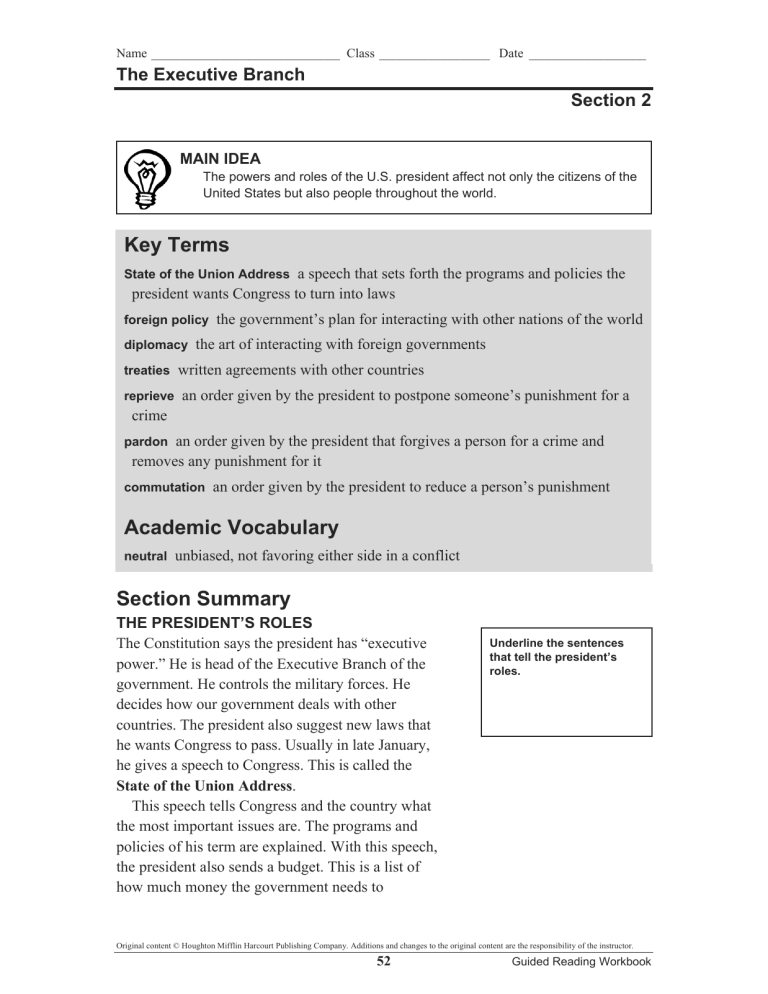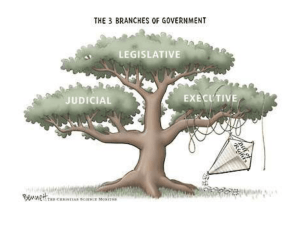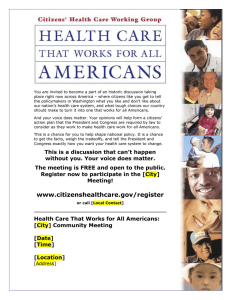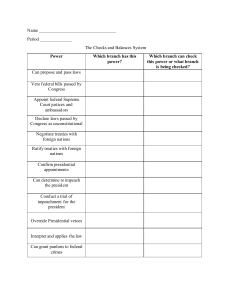
Name _____________________________ Class _________________ Date __________________ The Executive Branch Section 2 MAIN IDEA The powers and roles of the U.S. president affect not only the citizens of the United States but also people throughout the world. Key Terms State of the Union Address a speech that sets forth the programs and policies the president wants Congress to turn into laws foreign policy the government’s plan for interacting with other nations of the world diplomacy the art of interacting with foreign governments treaties written agreements with other countries reprieve an order given by the president to postpone someone’s punishment for a crime pardon an order given by the president that forgives a person for a crime and removes any punishment for it commutation an order given by the president to reduce a person’s punishment Academic Vocabulary neutral unbiased, not favoring either side in a conflict Section Summary THE PRESIDENT’S ROLES The Constitution says the president has “executive power.” He is head of the Executive Branch of the government. He controls the military forces. He decides how our government deals with other countries. The president also suggest new laws that he wants Congress to pass. Usually in late January, he gives a speech to Congress. This is called the State of the Union Address. This speech tells Congress and the country what the most important issues are. The programs and policies of his term are explained. With this speech, the president also sends a budget. This is a list of how much money the government needs to Underline the sentences that tell the president’s roles. Original content © Houghton Mifflin Harcourt Publishing Company. Additions and changes to the original content are the responsibility of the instructor. 52 Guided Reading Workbook Name _____________________________ Class _________________ Date __________________ Section 2, continued function. Congress uses this plan to write laws. The president can veto, or reject, any laws he or she does not agree with. Congress can reject this veto. Two-thirds of both houses of Congress is needed to override the president’s veto. The commander in chief, or head of the U.S. armed forces, is the president. He or she can order a military leader to do what he says. The president decides how a war will be fought. The Constitution, however, says only Congress can declare war. The president can send forces anywhere they are needed. But the War Powers Act limits how long the troops can be gone without the approval of Congress. A nation’s foreign policy is how its government interacts with other countries. The president sends representatives who use diplomacy, or special skills, to have good relations with other countries. The representatives try to remain neutral when their countries fight. They help create treaties, or agreements between countries. The Senate advises the president on these treaties. It also gives final approval by a two-thirds vote. MORE PRESIDENTIAL POWERS The president names justices to the Supreme Court and other federal courts. A majority of Congress must approve these judges. The president also has the power to change the sentences of people who break federal laws. He or she can grant a reprieve, which postpones punishment. A commutation can reduce a person’s sentence. A pardon forgives someone of a crime and any punishment. CHALLENGE ACTIVITY Critical Thinking: Making Judgments Why do you think the president would pardon someone? Write at least two reasons for this kind of forgiveness. How can the president stop a bill from becoming a law, and how can Congress pass it anyway? The president can veto the law What role does Congress have in deciding when our military fights a war? Congress has the exclusive power to declare war under the Constitution What is the difference between a pardon and a commutation? A pardon is an official act of forgiveness granted by the government that absolves an individual of their guilt for a particular crime and restores their rights and privileges. A commutation is a lesser form of pardon that reduces the severity of a sentence, such as reducing a prison sentence to a lesser term or commuting a death sentence to life imprisonment. Original content © Houghton Mifflin Harcourt Publishing Company. Additions and changes to the original content are the responsibility of the instructor. 53 Guided Reading Workbook Name _____________________________ Class _________________ Date __________________ Section 2, continued DIRECTIONS Write two adjectives or descriptive phrases that describe the term. Diplomatic 1. treaties 1. 2. Binding Compassionate 2. pardons 1. 2. Clemency-granting Momentous occasion 3. State of the Union Address 1. 2. Addressing the nation 4. foreign policy 12 Global Diplomatic 5. diplomacy 12 Skillful, tactful 6. reprieve 1. Temporary relief 2. Momentary respite DIRECTIONS Read each sentence and fill in the blank with the term in the word pair that best completes the sentence. 7. Congress wanted to declare war and join one side in the conflict, but the neutral president decided to remain __________________________. (neutral/diplomatic) State of the Union Address 8. During the _______________________, the president told Congress that he wanted new laws to aid education. (State of the Union Address/diplomacy) Treaties 9. The United States signed _____________________ with other nations to keep us safe in the world. (pardons/treaties) commutation 10. The president’s _______________________ allowed a popular politician to leave jail early. (commutation/foreign policy) Original content © Houghton Mifflin Harcourt Publishing Company. Additions and changes to the original content are the responsibility of the instructor. 54 Guided Reading Workbook






